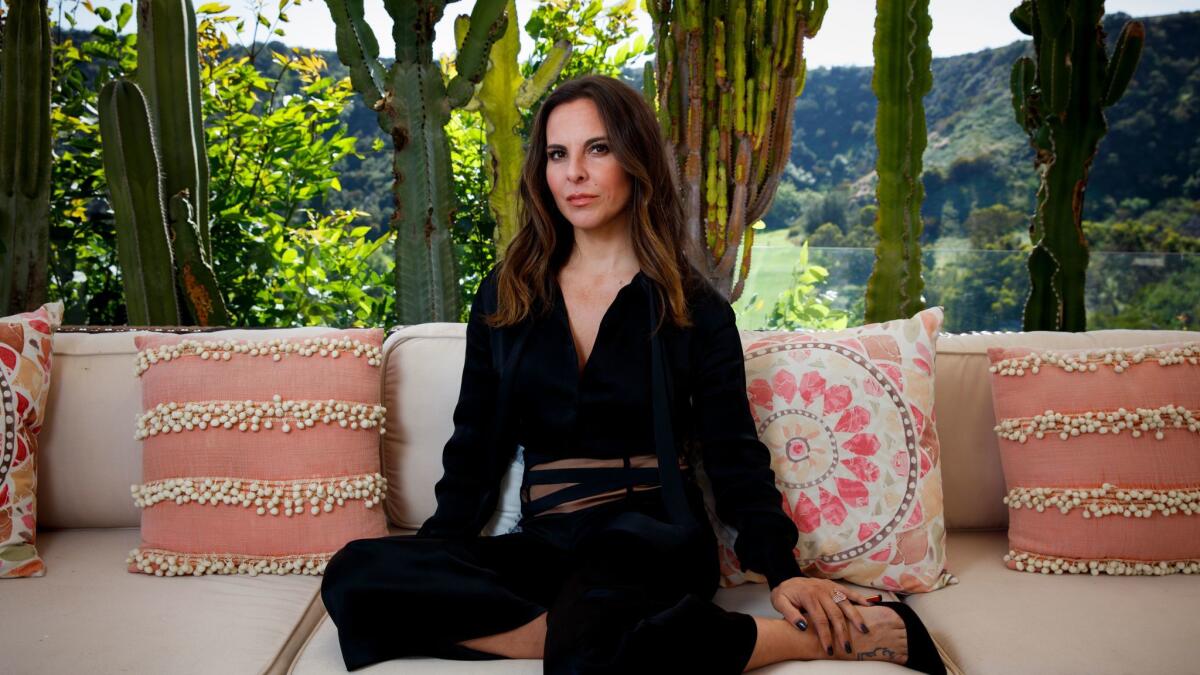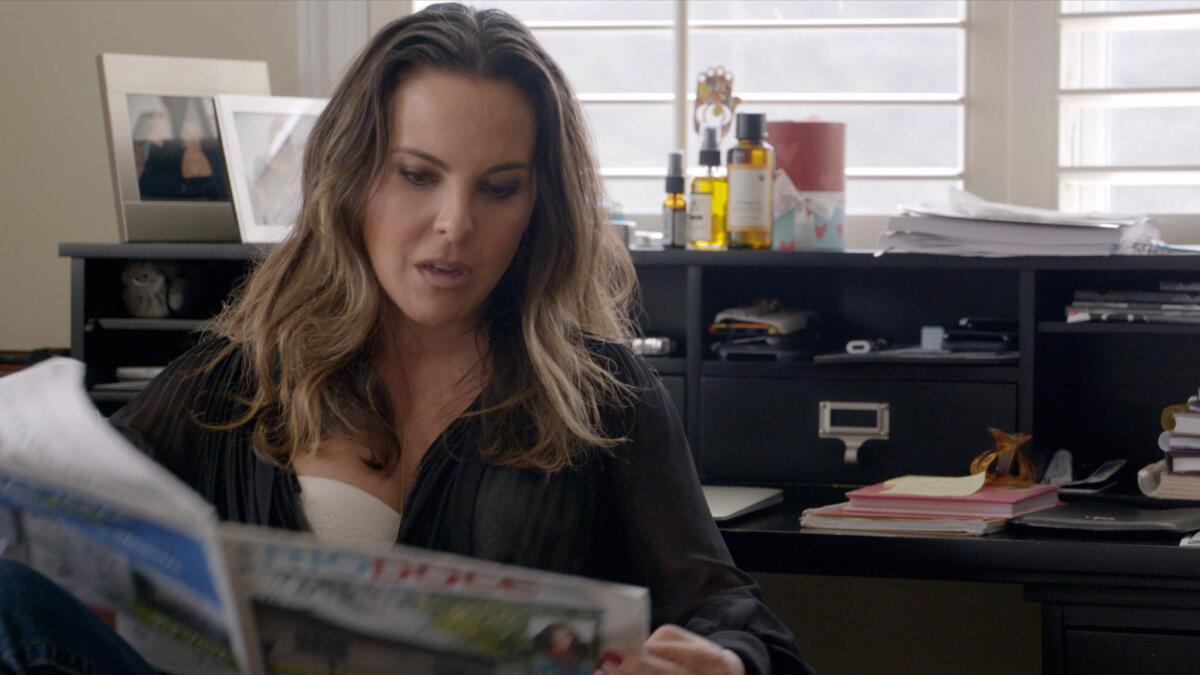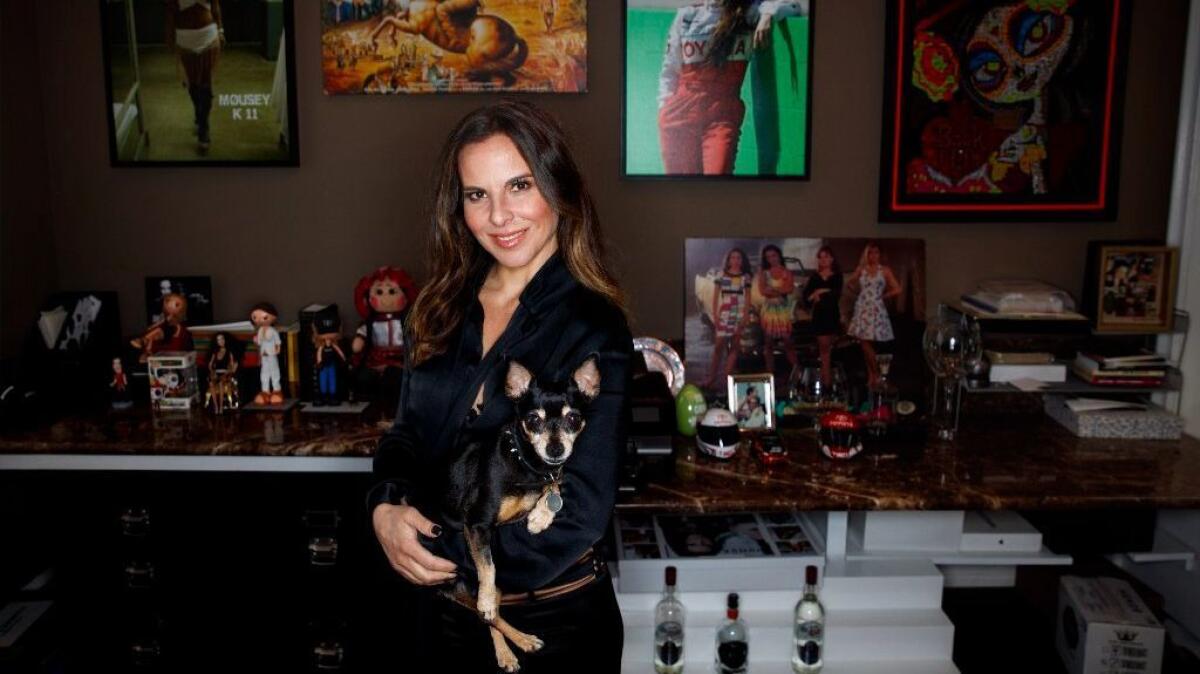Q&A: In the Netflix docu-series ‘The Day I Met El Chapo,’ Kate del Castillo tells her story

- Share via
If ever there was an example of the adverse effects of late-night Twitter use, it’s the story of how Kate del Castillo became entangled in one of the most bizarre stories of modern times.
The outspoken actress has long been a household name in Latin America and beyond thanks to her roles in numerous telenovelas such as “Muchachitas” (“Girls”) and “La Reina del Sur” (“Queen of the South”). Then a 2012 tweet, in which she expressed having more trust in Mexican drug kingpin
The tweet eventually led to text message exchanges and, ultimately, a secret introduction in Sinaloa in 2015. Del Castillo met with Guzman, who was on the run from Mexican authorities after breaking out of maximum-security prison (a second time), with the intent of making a film about his life after being contacted by his lawyers. Adding a real-life telenovela twist to the encounter: she was joined by actor
Guzman was eventually captured and extradited to the U.S. where he is awaiting trial on charges of drug trafficking and murder.
Del Castillo says the ordeal left her ostracized in her home country (Mexican officials launched an investigation into her affairs over possible money laundering charges in connection with El Chapo) and her career has suffered greatly as a result of the situation.
The three-part Netflix docu-series, “The Day I Met El Chapo: The Kate del Castillo Story,” now available on the streaming service, chronicles her side of how it all unfolded.
Penn and his lawyers have protested the release of the series, saying it includes false claims.
According to a statement given to the L.A. Times by Mark Fabiani, a spokesman for Penn: “These producers are propagating false and reckless fabrications for their profit. This is nothing but a cheap, National Enquirer-esque tale spun by a person whose hunger for fame is both tawdry and transparent. Sean Penn made an attempt to correct the documentary’s shoddiness and profound inaccuracies, an attempt which the producers rejected out of hand.”
A Netflix spokesperson said Penn was given multiple opportunities to participate in “The Day I Met El Chapo” and did not do so: “The events surrounding the now-infamous meeting have been well covered, including by Penn himself in Rolling Stone and his many public comments since. The only new ground we're breaking with this series is to give Kate a chance to finally tell her side of this stranger-than-fiction story.”
In a recent telephone interview with The Times, the 46-year-old actress, who currently lives in Los Angeles, talked about the tweet that launched it all, Penn, and navigating life in the U.S. in the era of Trump.
Was this documentary something you were seeking to do or were you approached?
Netflix approached me. We already had a relationship for “Ingobernable” (“Ungovernable”), another TV series. To be honest, I was, and I'm still, fed up with this thing. I didn't want it in the beginning. But then I asked my parents, because they are the ones that have been suffering the most. And my lawyers. We all thought, at the end, that it would be a good idea, just to get it out of my chest and speak my truth.

In the first installment, you say something to the effect of the cameras offering you protection. Talk about what you meant by that.
Listen, I've always been outspoken and I've gotten into a lot of trouble. I had to go to the Inter-American Commission on Human Rights in Washington [D.C.], to do something. Because in my country, they are violating my human rights.
I'm not going to stay silent. I'm going to speak out. That’s what I mean about the camera being my protection. It gives you a shield, in a way, when you say who is the criminal or when the one who is abusing you is exposed. So, it would be really stupid if something happened to me. I am not afraid. I think I've been through the worst part already — me and my family. I think if the truth comes out and it's on your side, it will win.
Did you look back on things differently with some distance from it?
I know it's been years, but for me, it's been nothing. It's been two years that I have put my life on hold because of this. So, for me, it's fresh. You go back again to the same day. Yes, it scares me sometimes. It sometimes makes me cry. Sometimes it makes me really angry. I still have that in me. I'm much better, though. But going back, in a way, is cathartic too.
Do you regret sending that initial tweet?
No, I have no regrets.
I'm not going to stay silent.
— Kate del Castillo
How do you live your life now? When did you feel like you didn’t have to look over your shoulder? Or is that still a feeling?
I do sometimes. I don't know if my cellphone and my landline are still tapped. But I don't care anymore, because I have nothing to hide. Because I cannot live with that fear. It's just too much. It takes a lot of energy from me. I need to concentrate and go back to my career and put myself back together. If they're listening to me, they're going to get bored. So, ever since the investigation was closed, I feel much better.
What has this done to your career?
Well, I haven't worked in two years. I did “Ingobernable,” thanks to Netflix. They are the only ones who stuck with me. For that, I will always be thankful. You know, we're actors and sometimes we work a lot and sometimes we don't work a lot. But my life was literally stopped by this. If it wasn't for Netflix, I would have had to sell my house. That's for sure. It's two years that I haven't been working, but paying a lawyer in the United States and three lawyers in Mexico. So, it's not easy.
I've been auditioning lately a little bit and having meetings.
I don't want people to think I'm a victim. I'm responsible. I decided to go down there. That's the consequences. I'm getting much better. I've always worked, my entire life. I've never asked for any favors, and I'm not going to do it right now. So, I'm going to work my ass off. I will recuperate the money and my life and my career back.

Do you still plan to make a movie about El Chapo?
That's not my priority. I already risked my life for that, so I really do want to do it, because I think it would be an amazing, fantastic story to tell. It would be appealing for both countries and the world, just to know a little bit more. Where does this little boy from Badiraguato become the biggest drug lord, and who helps him and how? I am interested in knowing the truth and go deep inside of that.
What is it about that world that you think captivates audiences?
For Mexicans, it’s because we live that every single day. It's something that is not changing. It appeals to every part of the world because that's how far they get. Who helps them? Who are the real criminals? I'm not saying they're not. I'm just saying, who helps them? Both countries, both governments. Not until the people stop snoring, this is not going to end. There could be a thousand more Chapos. That's not going to end.
We've seen that Sean Penn is not happy about this documentary. Have you heard from him directly?
No, I haven't heard from him. I know that he saw the documentary and he was not happy about it. But he had his opportunity. We approached him. We reached out to him. And he ignored us. So, they had their opportunity. They decided to ignore us. I'm so sorry, but it's too late. He can do his own documentary.
Any communication with El Chapo? Have you been communicating through the lawyers at all?
One of [his] lawyers, Andres Granados, is in the documentary, He's there, and I really appreciated that he wanted to participate. But that's it.
Do you view El Chapo as a sympathetic character?
No. That's not the case. It's not that I feel bad that he was captured. He belongs there. It's just that my instinct was the timing [of his capture] was too much of a coincidence.

What would you say to him now?
Oh, my God, I don't know if I would ever see him again or ever would want to see him again. I know, if I ever want to do the movie, probably not me but the writers sit down with him and ask him a lot of things. The only thing that I could say is that I had nothing to do with it. I know they know I had nothing to do with it. If not, the lawyer would not have participated in the documentary.
How is it like trying to navigate life in the U.S. in the era of Trump?
I have so much to say about that, although I always get in trouble talking about politics. The only thing I can say is that I am an American citizen now. I'm very grateful to the Americans because they opened the door for me and gave me the opportunities I did not have in my country, which is already sad that I have to leave my country in search of better opportunities.
But unfortunately, I became an American in the worst time, with a president that does not represent me. And the Mexican president does not represent me either. It's kind of sad, but I'm also happy and it gives me hope to see all of my paisanos, all of my Latin people, that come here to work, to try a better life. We're united and I feel more Mexican now than I did before, and more proud of my roots and everything.
Sean has no power over me. He did. But he has no power over me. So, let's not give him that power. He wanted to edit. He wanted to stop it. He wanted to do a lot of things with the documentary. No. If I was not afraid of El Chapo, I was not afraid of the Mexican government, why would I be afraid of this guy? He's only a guy.
When do you think you’ll visit Mexico again?
Well, legally I could, but after living this for two years and seeing firsthand what the Mexican government has done with me and what they're capable of, I don't feel protected. They killed the investigation, they opened another one, they killed it, then they opened another one. I don't know what their plans are. Now, with the documentary, I don't know how they are going to react. I have no business there. I haven't worked in Mexico in a long time. My parents come visit. The only business I have in Mexico is the tacos. That I miss, to eat some tacos and some good food. Other than that, I have nothing there right now. My heart is there, for sure. I wish I was there to help in the earthquake, but I can't. So I only can do what I can do from where I am.
------------
‘The Day I Met El Chapo’
Where: Netflix
When: Any time
Rating: TV-MA (may be unsuitable for children under the age of 17)
ALSO
Harvey Weinstein faces assault claims from two more women, and his company is sued for negligence
Notorious photographer Terry Richardson no longer welcome at Condé Nast International
Robert Guillaume, Emmy-winning actor in 'Soap' and 'Benson,' dies at 89
The complete guide to home viewing
Get Screen Gab for everything about the TV shows and streaming movies everyone’s talking about.
You may occasionally receive promotional content from the Los Angeles Times.




